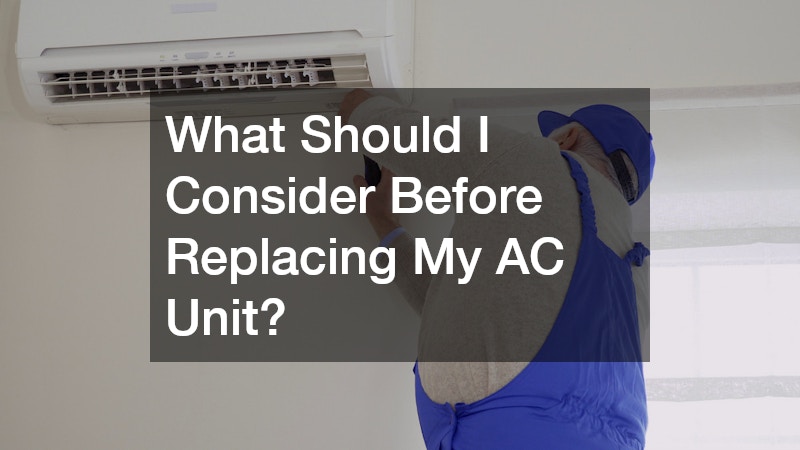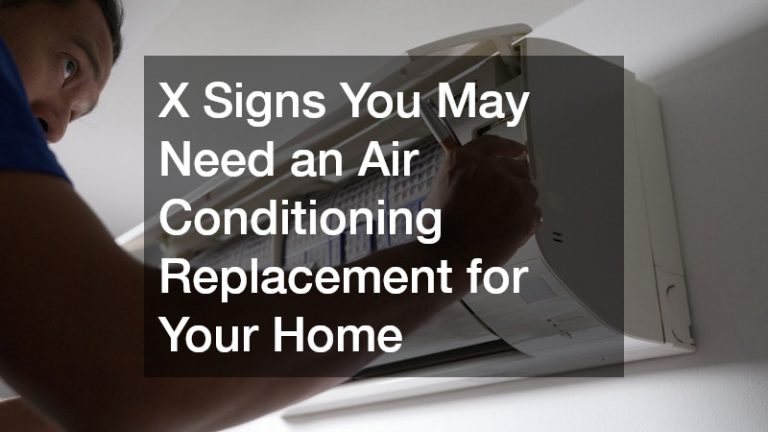Understanding when it is time to replace your air conditioning system can prevent unexpected breakdowns and costly repairs. It’s crucial to recognize the signs indicating that your air conditioning (AC) unit may need to be replaced rather than continually repaired. This article will discuss key symptoms of a failing AC and provide valuable answers to common questions homeowners have about air conditioning systems. Knowing these signs can save money and improve the comfort of your home. By the end of this article, you should be well-equipped to determine whether an AC replacement is necessary for your home.
How Do I Know if My Air Conditioner Needs Replacement?
If your air conditioning unit requires frequent repairs, it might be more cost-effective to get an air conditioning replacement rather than continue financing its diminishing performance. Frequent breakdowns are not only inconvenient but also indicative of an underlying inefficiency or failure in system components. The costs of repeated repairs can quickly accumulate, surpassing the initial outlay for a new, more efficient unit. Understanding the balance between repair costs and the benefits of a new system is crucial. Ideally, replacement should be considered if repair costs amount to more than half the price of a new AC unit.
Unusual noises such as grinding, squealing, or clattering from your AC unit can indicate that crucial components like the motor or blower assembly may fail. These sounds typically do not occur in well-functioning units and often denote that parts are worn out or malfunctioning. Similarly, unusual smells—like a burning scent—can signal burnt-out wiring or mold growth within the unit, which are serious concerns. Immediate attention to these odors and sounds can prevent major breakdowns. Neglecting these symptoms can lead to more severe issues, potentially requiring costly interventions.
Noticing that certain rooms in your house remain warmer than others even when the AC is running can be a sign of a failing system. This symptom, known as uneven cooling, suggests that your air conditioner is unable to distribute air efficiently throughout the house. Factors contributing to inconsistent temperatures might include duct problems, insufficient unit size, or a decline in the AC compressor’s performance. It is essential to address these issues, as they often indicate that the AC is nearing the end of its useful life. Ensuring that your unit is adequately sized and functioning correctly is key to achieving consistent indoor temperatures.
What are the Benefits of Replacing an Old Air Conditioner?
Modern air conditioners are designed to be much more energy-efficient than older models. Replacing an outdated AC can lead to significant savings on energy bills due to advancements in technology and stricter energy standards. Newer models typically feature better compressors and fans that consume less energy while providing improved cooling performance. Additionally, modern systems often come with programmable thermostats that help optimize energy usage. These features not only save money but also reduce your household’s carbon footprint.
Installing a new air conditioning system can enhance the overall value of your home. Potential homebuyers often view a new AC system as a significant upgrade that promises lower utility costs and fewer HVAC concerns in the near term. The presence of a new, efficient air conditioner can be a strong selling point in real estate transactions, indicating that the home has been well-maintained. Moreover, some energy-efficient air conditioning systems might qualify for tax credits or rebates, adding financial incentives to the benefits of installation.
What Should I Consider Before Replacing My AC Unit?
Choosing the correct type and size of air conditioner for your home is critical to ensure efficiency and comfort. An undersized unit will continuously run, trying to cool the space inadequately, while an oversized unit can lead to short cycling, wasting energy. Both scenarios can lead to increased wear and tear on the system, potentially reducing the lifespan of the unit. Consulting with HVAC professionals to conduct a thorough assessment of your home’s cooling needs can guide your purchase decision. The right unit, properly installed, will operate efficiently and effectively.
Replacing an air conditioning system involves various costs beyond just purchasing the new unit. Installation costs can vary widely based on the type of unit, the complexity of your HVAC system, and whether additional upgrades like duct modification are necessary. It’s important to factor in these installation expenses when budgeting for an AC replacement. Seeking several installation quotes and understanding what each service includes can help ensure that there are no unexpected costs. Remember, investing in a professional installation can optimize long-term savings and performance.
Knowing when to replace your air conditioning unit is vital to maintaining a comfortable, efficient home. Recognizing the signs that indicate a need for replacement can prevent discomfort during extreme weather and avoid unnecessary costs associated with patching an inefficient system. Furthermore, an understanding of the benefits and considerations involved in installing a new AC allows homeowners to make informed, economically sound decisions. Considering these factors will help ensure that your home remains a welcoming, comfortable sanctuary for years to come.

